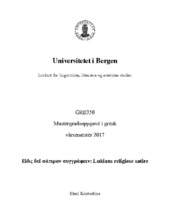| dc.contributor.author | Kontodima, Eleni | |
| dc.date.accessioned | 2017-09-05T07:00:02Z | |
| dc.date.available | 2017-09-05T07:00:02Z | |
| dc.date.issued | 2017-06-14 | |
| dc.date.submitted | 2017-06-13T22:00:16Z | |
| dc.identifier.uri | https://hdl.handle.net/1956/16547 | |
| dc.description.abstract | Sammendrag Tema Min masteravhandling har som tema Lukians satire som middel til kritikk mot religion, tro og overtro. Undersøkelsesobjektet er todelt: 1) Hvordan har Lukian brukt satire for å kritisere religiøse aktiviteter, myter og tradisjoner? 2) Hva kan vi finne ut om hans perspektiv på dette området? Metoder For å oppnå dette blir følgende prosess fulgt: Det blir oppgitt informasjon om omstendigheter i Romerriket i perioden han levde der på historisk, religiøst og filosofisk nivå. Lukians livsløp og bakgrunn blir presentert og begrepet ‘satire’ blir forklart. Forfatterens mest representative verker som stiller seg mot alle former for religiøsitet, direkte eller indirekte, blir undersøkt. Med dette som utgangspunkt og ved hjelp av eksisterende litteratur blir det vurdert hvorvidt man kan oppdage personlige synspunkter ut av verkene som ble undersøkt. Resultater Basert på eksisterende litteratur og mine funn kan jeg oppsummere at Lukian foraktet alle former av religiøsitet og overtro. Hovedfokus la han på de tradisjonelle greske gudene og alle oraklene, hvis representanter han anklaget for bedrageri. De satiriske dialogene hans, med intens ironi og karikaturer av svake guder og falske profeter beviser dette. I tillegg var han kritisk mot filosofer som trodde på gudenes eksistens og et liv etter døden, hovedsakelig stoikerne. Med sine skrifter sørget han for å latterliggjøre dem og deres ideer, mens han viste sympati mot både epikureere og de første kynikere. Til tross for at ideene hans er ganske klare angående den hedenske tro, er det ikke like klart hva han syntes om kristendommen. Fagmiljøet er delt på dette området og etter mitt syn var han likegyldig mot dem. Overtroiske ideer og magi så Lukian ned på og lo av. Det kan regnes som merkelig at han ikke dekket hele det overtroiske aspektet, ved for eksempel å kritisere demoner eller astrologi, men svaret er kanskje så enkelt som at han ikke hadde behov for å utvide sin omkrets. Mer forskning blir forhåpentligvis utført i fremtiden, slik at temaene som regnes som vage belyses og man kommer til en endelig konklusjon. | en_US |
| dc.description.abstract | ABSTRACT Theme The theme of my master’s thesis is Lucian’s satire as a means of criticizing religion, belief and superstition. The object of examination is twofold: 1) How has Lucian employed satire to criticize religious activities, myths and traditions? and 2) What can we learn about his perspective on this area? Methods To achieve this, the following process is followed: Information is provided on the conditions within the Roman Empire during the period when Lucian lived there on a historical, religious and philosophical level. Lucian’s lifetime and background are presented and the term ‘satire’ is explained. The author’s most representative works that set themselves against all forms of religion, directly or indirectly, are examined. With this as the starting point and with the help of the existing literature, the extent to which one can discover personal opinions from the texts examined was taken into consideration. Results Based on existing literature and my own findings, I can conclude that Lucian despised all forms of religiousness and superstition. His main focus was on the traditional Greek gods and all the oracles whose representatives he accused of fraud. His satirical dialogues with intense irony and caricatures of weak gods and false prophets prove this. Additionally, he was critical towards philosophers who believed in the gods’ existence and a life after death, mainly the Stoics. With his writings he made sure to ridicule them and their ideas, while showing sympathy towards the Epicurians and the first Cynics. Even though his ideas are quite obvious regarding the pagan faith, his thoughts on Christianity are not as evident. The academic community is divided on this area, while in my view Lucian was indifferent towards the Christians. Lucian belittled and ridiculed superstitious ideas and magic. It can be considered odd that he did not cover the entire spectrum of superstition, e.g. by criticizing demons or astrology. However, the answer is perhaps so simple as that he had no need to expand his sphere. More research will hopefully be carried out in the future, so that light will be thrown on the themes that are considered vague and a final conclusion will be reached. | en_US |
| dc.language.iso | nob | eng |
| dc.publisher | The University of Bergen | eng |
| dc.title | Lukians religiøse satire | eng |
| dc.title.alternative | Πῶς δεῖ σάτιραν συγγράφειν: Lucian’s religious satire | eng |
| dc.title.alternative | Lucian' s religious satire | eng |
| dc.type | Master thesis | |
| dc.date.updated | 2017-06-13T22:00:16Z | |
| dc.rights.holder | Copyright the author. All rights reserved | eng |
| dc.description.degree | Gresk mastergradsoppgave | |
| dc.description.localcode | MAHF-GRE | |
| dc.description.localcode | GRE350 | |
| dc.subject.nus | 711508 | eng |
| fs.subjectcode | GRE350 | |
| fs.unitcode | 11-21-00 | |
